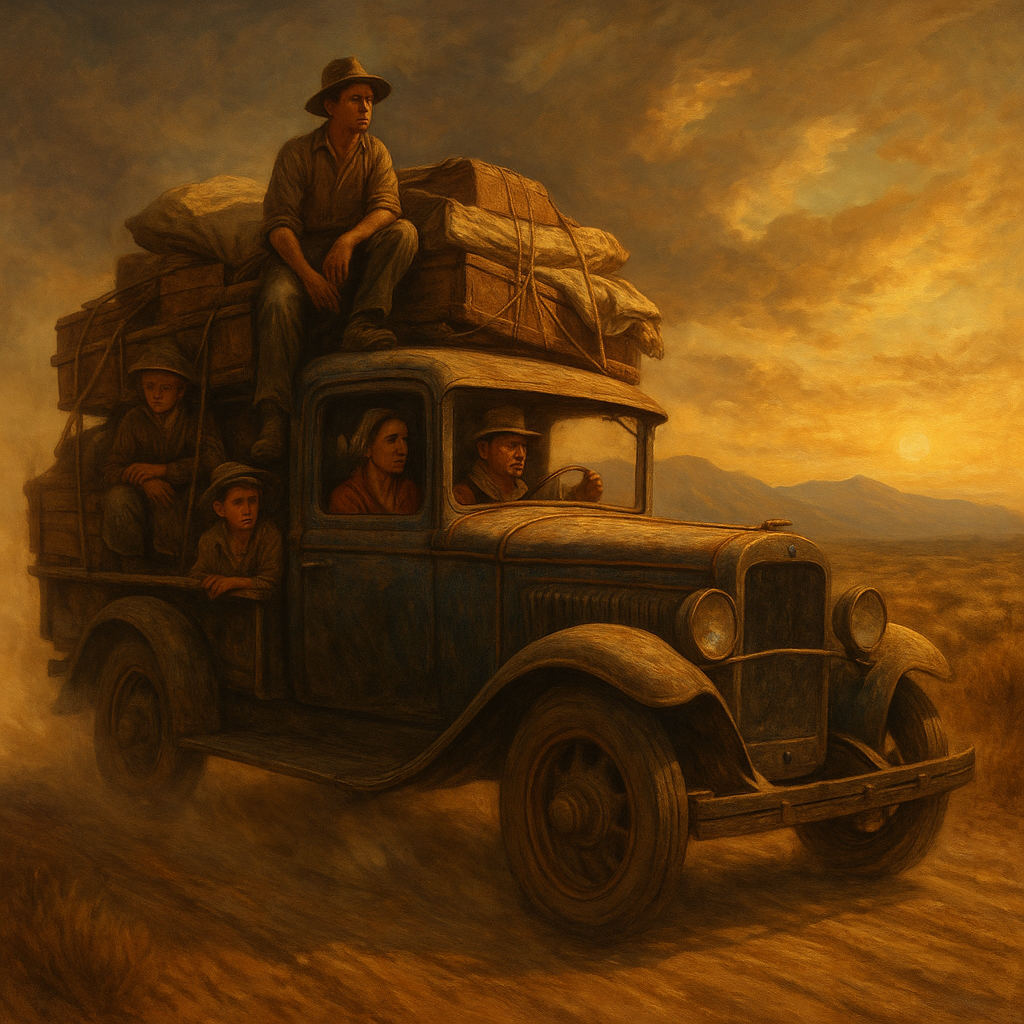By ABS, The Literary Scholar
(Who firmly believes that if hope were edible, the Joads still would’ve gone hungry)
There are road trips that start with playlists and picnic baskets. And then there’s the Joad family’s journey to California—a desperate, dusty pilgrimage across a broken America that doesn’t know whether it’s collapsing or just rearranging the deck chairs on its burning economy.
John Steinbeck‘s The Grapes of Wrath is not a novel. It is a slow-motion collapse, narrated with such aching beauty that you forget you’re reading about starvation, labor exploitation, and systemic betrayal—until you realize your stomach has clenched, and your throat has gone dry.
Written in 1939, and still pulsing with the urgency of now, this novel captures the death of the American Dream with the grace of a sermon and the fury of a protest sign.
Once Upon a Dust Bowl: Enter the Joads
Meet the Joads, a family of tenant farmers from Oklahoma, evicted from their land—not by war or flood or criminal negligence, but by banks. Nameless, faceless, tractor-driving banks who “can’t be blamed,” because they are, according to the men who evict, “just the way things are.”
“The bank is something more than men… it’s the monster.”
And so, like hundreds of thousands of real people during the Great Depression, the Joads pack what little they have onto a rusting truck and head west to California—a promised land advertised with orange groves and prosperity, but guarded like Eden after the fall.
California: Paradise with a Price Tag
If the American West once symbolized freedom, The Grapes of Wrath rips down the poster and replaces it with a No Vacancy sign.
The Joads arrive in California only to discover that jobs are a mirage, wages are rigged, and those “Help Wanted” flyers were more about crowd control than economic opportunity.
“There ain’t no sin and there ain’t no virtue. There’s just stuff people do.”
This is not Steinbeck’s America-as-dream. This is America-as-machine, grinding down anyone who doesn’t have boots, bank accounts, or the right last name.
The family moves from one squalid labor camp to another, learning that even freedom of movement has its limits when you’re poor, brown, hungry, or simply disposable.
Tom Joad: From Drifter to Prophet
Tom Joad begins the novel as a parolee—recently out of prison, hoping to keep his nose clean and his shirt unbloodied. But hardship has a way of radicalizing the soul.
Through the novel, Tom evolves—not in some messianic halo, but in a simmering clarity.
He watches his family disintegrate, one member at a time. He watches good men get blacklisted for asking for a fair wage. He watches Jim Casy, the ex-preacher turned union sympathizer, get murdered for believing in equality.
And then comes the line. The line every student, reader, and goosebump knows:
“I’ll be ever’where—wherever you look. Wherever they’s a fight so hungry people can eat, I’ll be there.”
Tom doesn’t become a savior. He becomes a shadow of justice, flickering where it’s needed most.
Ma Joad: The Backbone Wearing an Apron
And let’s not forget the real heroine—Ma Joad. While the men fall apart, wander off, or turn inward, Ma holds everything together with equal parts grit, grief, and gravy.
She doesn’t speak in grand monologues, but when she does speak, Steinbeck hands her thunder:
“We’re the people that live. They can’t wipe us out; they can’t lick us.”
Ma Joad doesn’t want power. She just wants her children to eat. And somehow, this quiet resilience becomes the most radical force in the novel.
The Ending: A Breast, a Barn, and the Most Haunting Scene in American Literature
No spoilers, but let’s just say The Grapes of Wrath doesn’t end with fireworks. It ends with floods, silence, and the most uncomfortable act of mercy ever written.
A starving man.
A barn.
A woman offering life through her body—not erotically, but maternally. Desperately.
It is unsettling. And unforgettable.
Because this is what the American Dream has come to: nourishment through desperation. Hope through human touch. Not with speeches, not with flags—but with a breast offered in silence.
A Novel About America. Written in Rage. Delivered in Poetry.
Steinbeck didn’t write this book for awards (though it did win the Pulitzer and help him secure the Nobel). He wrote it because injustice was real, and too few people were looking.
He wrote it with the precision of a historian, the heart of a preacher, and the fury of a union organizer.
His America was not yet lost—but it was being sold, acre by acre, soul by soul.
And if you think that was just 1939’s problem, allow me to quote the novel itself:
“How can you frighten a man whose hunger is not only in his own cramped stomach but in the wretched bellies of his children?”
Tell me that isn’t still the question.
And somewhere, ABS, The Literary Scholar, folds a map of America with dust on its roads and sweat in its margins, places a jar of dried peaches on the shelf beside a copy of Steinbeck, and whispers, “We keep driving. Because they never gave us a place to stop.”

Signed,
ABS
The Literary Scholar
(Who knows the American Dream often comes with unpaid rent and empty cupboards)
(Still waiting for a promised land that doesn’t need a protest sign to enter)
(And who believes that fiction like this is not about endings—it’s about enduring)
Share this post / Spread the witty word / Let the echo wander / Bookmark the brilliance

